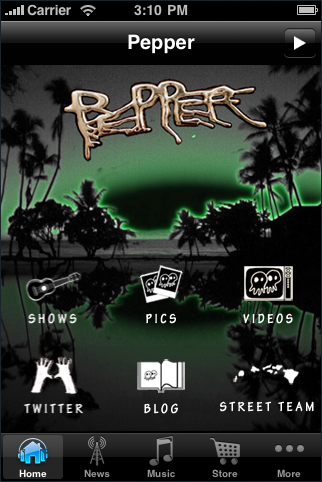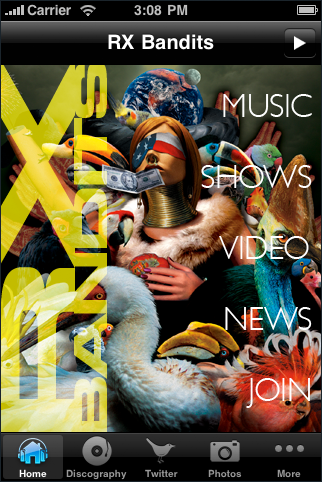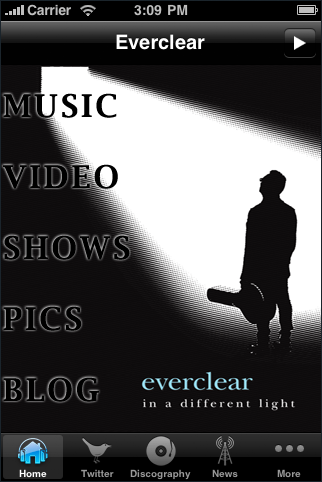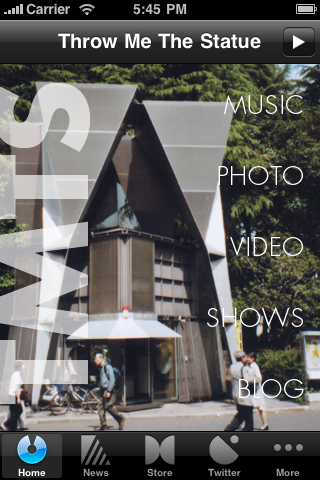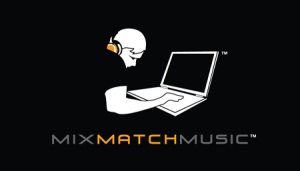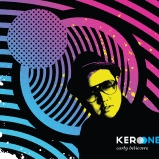
Kero One
When it comes to DIY, it doesn’t get much more do-it-yourself than Bay Area born and bred Kero One. When he dropped his first album, Windmills of the Soul in 2005, he made it completely at home, charged up his credit card, released it on a self-made label, Plug, and became a hit when one of his original 50 copies found its way to Japan. Earlier this year, Kero One released his sophomore album, Early Believers, and I sat down to chat with him about his upbringing, musical history and thoughts on the evolution of the music industry.
AC: So you talk on Early Believers about your parents moving to the Bay Area. Where did they move from and was it a big culture shock for them?
KO: Well they came from Korea originally; and then they came here when I was… zero. Probably in 1978 or so. From what I understand, it’s a little bit different, of course, but you know, they adjusted. What I talk about on “Welcome to the Bay,” it’s just some of the experiences that I witnessed when we were in the South Bay growing up. I talked a little bit about that and also, I guess just a little bit about their adjustment in terms of, they’re used to a whole different lifestyle and obviously like different types of food and things like that. But, yeah, I mean, it was different, but of course they adjusted. And then we grew up in the south bay, and you know, I’ve obviously lived there for pretty much all my life.
AC: Whereabouts down there, San Jose?
KO: San Jose, Los Gatos, Santa Clara
AC: So how has your family played a role in the music that you’ve created?
KO: Well I’d say they made me take classical piano when I was really young, so, in the sense of being forced to take piano lessons, that was a pretty big role because, even though I hated it back then, I’m pretty thankful for it because I use it a lot in my music now. And other than that, not that much because really, they didn’t push me to do music; I mean, they’re kinda traditional Asian parents in the sense that they wanted the more, “education thing is a big deal,” and going to a good college and getting what they understand is a good job, whether it’s an engineer or doctor or something like that. So, they were really pushing for that, and, you know, honestly, when I told them I was rapping, I mean you can guess what their reaction was. Which is understandable, I guess, but now they’re fully supportive.
AC: You talked about learning classical piano. That was maybe the first of many instruments you learned; did you go on to learn any others, or was that the only formal training that you had?
KO: Yeah, that’s the only one I had formal training in, and I did that for 10 years almost. Technically it was probably like five years because the other five, I was kind of not really there. I hated classical music, but, when I was in middle school, I was really into punk, and I got into Primus and a little bit of rock like Red Hot Chili Peppers, and we all know, Flea and Les Claypool, ridiculous bassists. That inspired me to pick up the bass, and I started messing with the bass a little bit. So, other than that, it’s just bass, piano and I play a little bit of percussion; so those are my three things right now.
AC: Do you spin?
KO: Yeah, and I DJ as well. I got into scratching quite a bit when I was in college, so I was into the whole turntables thing, try to beat juggle, flares. I DJ out mostly in the city, one off events and sometimes I go out and DJ internationally, but, yeah, right now I’m just trying to focus on the live stuff.
AC: Do you play your instruments live in concerts?
KO: Well, actually for the last show, what we did was I incorporated a little bit of live keyboard and a little bit of live drumming, but something that I’ve always wanted to do was play some instruments and rap at the same time ’cause I’ve never seen anybody really do that. I’ve seen people sing, but not really rap, so that’s what I’m gonna be doing on my new show; just a little bit of that, and incorporate, I got a guitarist, I got a singer, and so we’re definitely bringing in like the live element to the live show, ’cause a lot of the stuff on my album is actually played out, it’s not samples, so it seems pretty natural to have live instruments.
AC: Out of all those instruments that you’re playing, which one are you enjoying playing the most?
KO: I’d say probably the keys. I’m not stellar player in any of the instruments, but when I do play the keys, it’s definitely fun when you can come up with a nice chord progression or some good solos, I’d say the keyboard.
AC: So you were talking about Primus, Red Hot Chili Peppers; what are some of your other musical influences and what are you listening to now?
KO: Man, I pretty much am influenced by everything from Mobb Deep in the early 90’s to John Mayer to Daft Punk, I listen to it all. Probably the only thing I don’t really get influenced by is country — I mean everybody says that, right — country or like folk, or something, or obviously classical music. But yeah, I listen to pretty much everything; like I grew up listening to really being into the early 90’s hip hop stuff, classic stuff.
AC: What was the first rap album you really got into?
KO: I’d say probably LL Cool J, Radio — I think that was the one. And then the BDP (Boogie Down Productions) stuff. So, yeah, BDP By All Means Necessary. And then for me, you know, I listened to that era when that came out, and then I went back to study other artists. Then, you know, from there, just expanded to Rare Groove and Soul and other related genres.
AC: So your initial album kind of made its break in Japan.
KO: Yeah.
AC: I’ve followed a number of hip-hop groups from Japan, but what would you say about the scene and the culture over there in the industry in terms of hip-hop?
KO: Well, definitely the culture plays a large roll, in the scene of hip hop over there because their culture, as you probably know, is very intense in terms of studying and breaking things down. I mean, when I was watching TV, and they were talking about, Indian Curry, I mean I was just watching from the hotel room and they were Japanese chefs, climbing barefoot on trees in India with the Indian guys there, to show this is how they do it, this is where they get it from, this is what it looks like and what it smells like, and they’re like breaking it down. I mean, that whole mentality is just kind of standard to me out there. They do that with hip-hop, and out there I learned more about music than I ever have in that short amount of time, ‘cause they know hella information, I mean, all the good music somehow just gets funneled over there and they have it at stores, the people who sell music are super knowledgeable. I basically discovered all these artists from the UK, from Europe, in other parts of Asia, even the States, out in Japan, you know. It’s really weird. I think because of that, they’re able to push the envelope a little bit. It’s definitely on another level out there, I think, in some ways.
AC: Did you pick up any Japanese hip-hop that you really liked while you were back there?
KO: DJ Mitsu is part of a group and I picked up their albums. I picked up a few instrumental albums out there. When I go out there, usually the labels will give me like a stack of CDs, so there are a couple CDs in there that are pretty dope. But yeah, definitely. I’m always getting new music while I’m out there.
AC: What’s been the most enjoyable part of the transition from web design and tech that you were doing to producing your own albums?
KO: Not having to listen to the boring meetings. I used to fall asleep in those meetings, you know. A lot of times I’d be at work, I’d be thinking about labels, music, I’d be stepping out very frequently to do maybe a press interview in the UK or whatever and since it’s international, you can’t miss that call, and so, you know, I gotta get up and go out and people probably started wondering why I was leaving so frequently. I still actually do a lot of web design now for my own stuff, so I haven’t strayed away from that too much. I hope to soon, but I don’t really miss the technical stuff that I need to learn, you know, just for that company; so now I can do whatever I need to do fix the public website or update the Kero One website or things like that.
AC: Have you retained or used anything from the job in actually getting your music heard?
KO: Well for sure in the sense those skills, I can apply to making websites, making them a little more functional, adding a little bit of interaction with it, like for example a mailing list, or something like that, whereas, you know, if I didn’t learn all that stuff, I’d probably be just a blogger or something, which is fine, but, for me, I’ve been able to take advantage of that. For example, I’ve pretty much configured our whole webstore on the website and now people can purchase things online. So, yeah, in that sense, that’s helped me a lot; so I definitely can’t ignore that.
AC: One of the lines I like from the new album is “wearing so many hats that your hair is concave.” So what’s been the hardest part of the scenario and trying to do it all for your label from rapping and producing your own music to being the label head?
KO: It’s definitely prioritizing your time. I had a PDA phone, which really kept me in check, but prioritizing time and figuring out where things need to be is probably the biggest challenge and now I have employees. Being able to stay on top and make sure that they’re being managed and they’re getting tasks done definitely takes up a lot of energy, but I think it’s definitely part of the grind, It’s a learning experience; I’ve learned a lot about the business. I’d say that another challenge is that I don’t want to take the business side to kind of supersede the creative aspects of my life, like the things I’m trying to do musically, I don’t want them to get pushed out of the picture, so lately with employees and things like that, it’s been helping out a lot, but there’s nothing without challenges.
AC: This whole album is full of really jazzy hip-hop, a lot of jazz influence on it; what was the approach that you used to make these songs and was your intent to go that heavy with the jazz? Was that something you wanted to do?
KO: You know, it’s really weird, I always get that comparison out and get told that it’s very jazzy and I guess I’m not ignorant to that fact, but I don’t actually say I’m gonna try to make it like this. I just usually try to go with what I like and just want to make something I enjoy. For some of the tracks, like “Love and Happiness,” which was produced by King Most, I mean, he just played me a bunch of beats, but when he played that one, that jumped out. I was like “Dude, that beat is ridiculous. I’m gonna have to add that.” So, you know, it wasn’t really a conscious thing to make it like that, but the other approach for this album was that, as opposed to Windmills, I wanted to give a little more diversity in terms of the tempos, the arrangements, I’m bringing in different Soul artists and features and just make it a little bit, I guess, less heavy. Because the first album, Windmills, was very personal and there were a lot of things on there that were very sexual. I mean this one, even though I put that in there, I also wanted to balance it out with something that’s a little fun, tracks like “Keep Pushin’” where you could have people dancing to it. I really wanted to keep it diverse.
AC: Your music sounds pretty complete in terms of the concepts that you have behind it, the musical ideas that you’re trying to bring into it. What are your thoughts, then, on the burgeoning remix and mash-up cultures?
KO: I’m really down with it, actually. As a DJ, I love finding music to remix or mash-up anything because I like to play songs that, even though they may be popular, ’cause they get people dancing, and they get people into the groove, it’s always nice to throw a curve ball at them, you know. I’m all about remixing stuff. I’ve done a few myself; I did a remix of Common’s “The Light.” DJ King Most, whom I worked with, we released some of his remixes for the DJs, and so it’s something that I’m definitely into playing. I don’t do that many in terms of, you know, taking well-known a cappellas and remixing them, but I do like projects here and there that are commissioned, I did a Talib Kweli remix and I’m working on a few Asian artists right now that I’m remixing, this group called Epik High.
AC: What do you think of making your stems available?
KO: Oh, for other people to remix.
Well, I have had a few a cappellas out there for people to remix, and I’ve gotten a few back. As far as stems, as in actual parts, not really, I’m not too into that. I feel like a remix should be like a regenerated or a totally new look at the beat and the project and the vocals. Otherwise, there’s no point to me.
AC: Between the record labels, the MP3s, the file sharing, where do you see music now, and where do you see there being a nice meeting place between consumer happiness and artist revenue?
KO: It always makes me a little, um…I don’t know, it’s like a mix between a chuckle and frustration when I hear people saying, on the blogs or whatnot, that “artists need the exposure and that’s why we’re gonna file share.” I mean, come on, that’s like complete BS. Honestly, for me, I’ll admit, I have downloaded illegally and when I have done that in the past, it’s just ‘cause you want the music, you know, it’s not any of the other stuff. I mean, it’s something that’s gonna be free and it’s gonna be in front of your face and most of the time, people will just take it. So, I don’t think it’s the people’s fault out here who want music; it’s the fault of the government and the regulations that aren’t being pushed appropriately on the internet.
For example, when we released Dream Talk, The Tones album, that released and it was at the top 50 of iTunes downloading, and then, a couple days later, all these blogs started showing up with the illegal download links for the albums and, in the dashboard you could see that the sales just plummeted. Right on that day, they just plummeted. And these kids, they’re hungry, and they’ve got mouths to feed, they’re trying to do music full time, so it really makes it tough. Of course we’ve got a team working on it on the security side, but it would definitely help, if and when these government regulations come into place that it kinda polices the activity out there, because, contrary to popular belief, artists do really get hurt by that. Maybe not a Kanye West, for example, but independent artists definitely don’t get to see that kind of return.
I think in that sense, I guess I could see the other side of the argument that, yeah, people have discovered a lot of great music through that as well. When I went to tour in Poland, I had people come up to me, and was like, “yeah, I’m sorry, we all downloaded your music illegally, but there’s no other way we can get it, we’re poor,” and all this stuff. Whether it’s true or not, they were there at the show and I see both sides. So, I think, back when albums were being sold for 10 dollars at Warehouse or whatever and there was nowhere else you could find that, I think a lot of people found out about those albums. I mean, when Nas or whatever came out in the 90’s to Berkeley, that show was packed, and it’s not because people got free music necessarily, it was just ‘cause they heard it on the radio and then they went and supported it and they got real’ into it, ‘cause really there was no real file sharing then. So, I think even with clamping down on illegal file sharing, things can still be really good, but we’ll have to see. We’ll have to see what happens; I really can’t predict it.
AC: Have you seen more of your revenues and artists from iTunes sales or from hardcopy CDs and shows
KO: I would say, probably from iTunes sales. CD sales have just dropped, like, pretty crazy. Though we still get a lot, you know, but it’s a lot slower.
AC: Have you started working on new songs already?
KO: No, I haven’t. I mean, I’ve been working on some remix projects, like I said, with the Korean group Epik High. I’m also mustering up some ideas on another project, but I haven’t actually started working on anything. I always like to release something and kinda reset and kinda figure out what I wanna do.
AC: So what’s up next for the Plug Label?
KO: Well obviously this album we’re gonna promote. We’re still promoting the Dream Talk album. I got a project comin’ up with this guy Green Tea, he does kinda like hip hop, kinda house beats. And then we got DJ King Most, who’s releasing a hip hop album with a bunch of guests. We’re gonna try to keep busy and really take it to that level of being an established label.
AC: How’d you connect with The Tones?
KO: Well The Tones, I actually heard about them on Myspace a while ago. I forget exactly how it happened, but we started chatting and then they had a couple tracks together, but not a full album. I liked what I heard; I mean, I knew that they had something special in terms of their sound, and so after a few chats, I signed ‘em and they basically simply got a full album together and then we went from there. And then we released that album in December!
AC: Yeah, that album’s good. It’s really good.
KO: Thanks. Yeah, I’m sure they’ll appreciate that. It’s interesting because I knew that, it’s definitely a good sound, I just didn’t know how impactful it would be in the hip hop community, ‘cause I guess a lot of people in the hip hop community really wanted to hear something like that. So, yeah, it’s pretty cool that they’ve been received that way.
AC: I think as pop hip hop goes further south in terms of quality, I think there’s gonna be even more of a backlash going the other way to find quality hip hop. Do you want Plug Label to be your side thing, and you’re doing music? Or do you envision Plug Label getting to a place where it’s up there with Stones Throw or Rhymesayers, or do you want to keep it small?
KO: I’d say I want to keep it small in the sense that everything that we put out is still hand-picked and not just to throw it out there, you know, to have a full release schedule. If we have to wait six months for a good album, then we’ll wait six months before we release it. I just feel like the more and more that we add to a catalogue and the more and more I compromise the vision of it musically, I feel like that’s where I’m gonna start losing interest in the label, and others will probably start losing interest because really, the problem I see right now is there’s too much information out there, you know, too much music, and I really wanna be able to kinda like consolidate that to people. That’s my vision, you know. So we’ll see what happens.

